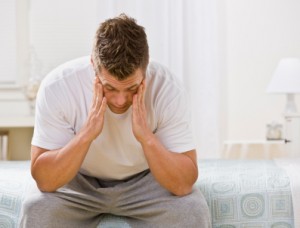Clinical depression is a major depressive disorder. A diagnosis of clinical depression is made if one has a persistent, severe form of depression. It is significantly different from regular depression. The major difference between a person who is diagnosed as being depressed and a person who is diagnosed as clinically depressed has to do with severity and time.
For example, a person who has experienced the recent loss of a loved one may technically be depressed for a period of time; however, it doesn’t last forever. On the other hand, a clinically depressed person could be someone who maybe lost a loved one several years ago and hasn’t been able to get past that event in their life. The first example would be a temporary situation while the other would be persistent and ongoing.
Common Symptoms of Clinical Depression
Below is a list of the major symptoms of clinical depression:
- Feeling down or sad most of the day (nearly everyday)

- Major shift in weight (up or down)
- Sleeping problems (too much or not enough)
- Loss of interest in activities which were once enjoyable
- Feeling fatigued and without sufficient energy (nearly everyday)
- Trouble with concentration and memory
- Inability to make decisions
- Persistent thoughts of death and/or suicide
- Feelings of guilt, hopelessness and worthlessness
- Slowed speech and activity (noticeable to others)
A physician will typically be looking to see if at least one of the symptoms is either feeling sad all the time or loss of interest in activity; in addition to one of these, if there are at least four other symptoms present, a person would be diagnosed as clinically depressed. The symptoms also need to have been present for a minimum of 2 weeks.
If you, a family member or friend is clinically depressed and has thoughts of suicide get help immediately. People with clinical depression have a greater chance of suicide than the general population. Help is available. Contact your doctor or local suicide hotline for immediate help. The U.S. Suicide Hotline number is 1-800-273-8255. A trained counselor is available 24/7 to talk with you.
Causes of Clinical Depression
Experts aren’t certain what exactly causes a person to become clinically depressed, but research has shown that there are certain risk factors that increase the chances of becoming clinically depressed.
Common causes and risk factors include the following:
Genetics
Looking into a person’s family history could very well explain the onset of clinical depression; often times there are no major life events or other stressors causing a person to become severely depressed. Clinical depression with no external event as its cause is more likely to occur in those who are genetically disposed to becoming clinically depressed.
Also, women are twice as likely to be clinically depressed as men. For those depressed during menopause or pregnancy, experts think the depression is caused due to changes in hormone levels that are common during these major times in the lives of women.
In addition, while a person can be diagnosed as clinically depressed at any age, it is most common to occur from mid-twenties to mid-forties.
Excessive alcohol consumption
Alcohol has been shown to lower the amount of “feel good” chemicals in the brain. Both serotonin and norepinephrine are reduced in the brain when alcohol is consumed in abundance and can directly contribute to clinical depression setting in. Alcohol is a depressant to not only the brain, but the nervous system as well.
Some experts believe that alcohol is often used to self medicate depression and/or bipolar disorder depression which in turn can make the clinical depression worse and more severe as alcohol is a natural depressant.
High stress level
Stress, in small doses, has its place in a person’s life; it can keep a person on their toes and help them stay motivated. If stress lasts for an extended period of time, it can actually cause physical damage to a person.
Chronic stress is linked to an increase in the stress producing hormone known as cortisol. Stress, over time, can also reduce neurotransmitters in the brain, like serotonin, which lead to feelings of sadness and hopelessness.
Early trauma
There are events which happen in the lives of children which impact them later on in life. Children may have received verbal abuse from a parent or sexual abuse from a family member, friend or someone they should have been able to trust.
These are examples of events which could occur in childhood that might lead to clinical depression when one becomes an adult. In cases where there was significant trauma to a child, the brain gets damaged in a way that makes them more susceptible to chronic depression later in life.
Hormonal changes
A drastic change in hormones can also trigger the onset of clinical depression. These hormonal changes can be linked to menstruation, menopause, the thyroid or a number of other conditions. When looking at the endocrine system of people who are diagnosed as clinically depressed, they are able to see an abnormal level of hormones in the blood even though the glands are perfectly healthy.
 Treatment for Clinical Depression
Treatment for Clinical Depression
There are many different roads to attaining the perfect treatment for clinical depression. Each treatment plan will be unique and determined by the patient’s medical history and circumstance. The treatment options listed below may be used on their own or in combination with other treatment options not listed. The determination for the best course of treatment will be made between the person and their doctor or medical health care professional.
Drug Medication
There are several antidepressants available and one of them is likely to be prescribed to a person who is clinically depressed. Medications like Zoloft, Paxil and Prozac are what is known as Selective Serotonin Reuptake inhibitors or SSRIs and are among some of the most commonly prescribed medications for clinical depression.
SSRIs block the reuptake of the neurotransmitter serotonin. This specific category of medicine is popular because it is said to be non-habit forming. There are some side effects like restlessness, decreased sexual desire, and insomonia. While some side effects of these drugs may stay, others may go away once the body adjusts to the medication.
Psychotherapy
Therapy is also a useful tool in the treatment of clinical depression and is a way to get to the root of a person’s psychological problems. There are Behavioral/Cognitive therapists who will help people change the way they think and view things so as to not trigger depression in the future. This type of therapy allows a person to talk through their issues as well as examine relationships they have been or are currently in to see if they are healthy or toxic.
Additional Treatment Options
There are plenty of additional treatments available for clinical depression, but medicine and therapy are the two most widely used and recognized among those available. There may be cases where clinical depression requires Electroconvulsive Therapy or a stay in a Resident Program, but these options would likely be tried once it was determined more than medication or out-patient therapy was necessary.
Anyone suffering from clinical depression should be aware that there is treatment available. They just need to be willing to reach out for help and get a treatment program designed which is tailored to meet their specific needs.
Related Posts



